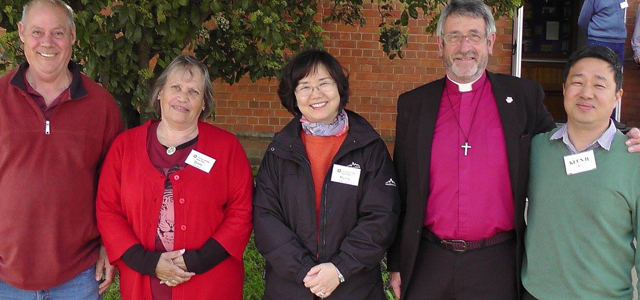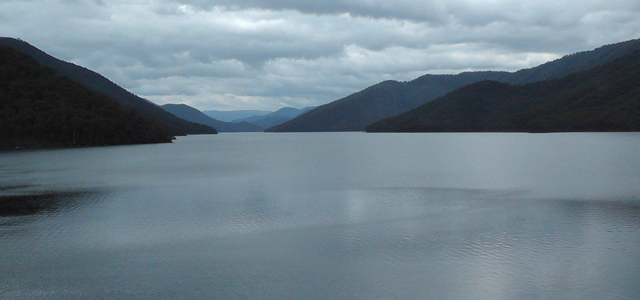The Murrumbidgee River Tour was organised by the Synod’s Murray Darling Basin Group. It has taken forward the Synod’s vision for our Church to be a transforming presence for the common good in that area. Group members share their experiences and reflections from the tour.
Contrasts and Constants
Our journey took us through valleys and slopes of the Great Divide, undulating croplands, and the mesmerisingly flat riverine plains around Hay. In all places, the Murrumbidgee was centre stage. We appreciated the river’s differing importance: in some places, it was a town’s water supply or irrigation; in other places, it was its impact upon power generation for homes and industry, or its importance for Indigenous Australians.
We travelled through and stopped at large population centres (including Wagga Wagga, New South Wales’ largest inland city at 65,000 people) and small ones (like Merriwagga, population less than 200). While the river changed in many ways, it always remains significant for residents along its course.
Our stops at Uniting Church Congregations were a particular highlight. We appreciated each Congregation’s welcome, as well as their country hospitality. We also admired parishioners’ hard work and devotion in their Congregations and local areas.
This trip traversed similar territory to a trip I took in 2007. Back then, the roads were dusty, the river levels low, the floodplains seemingly dry with little surface water, and fields, crops and livestock showed the effect of periods of low rainfall. This year, the rivers are high, the floodplains inundated, and farmland shows the impact of recent heavy rains
Geoffrey Paterson, Melbourne
…drawing together his cultural tradition with the Christian tradition.
Acknowledging Country
Acknowledging country took on new meaning for tour group members. On arriving at Narrandera Uniting Church, we were extended a ‘welcome to country’ by church member Michael Lyons (both a Wiradjuri elder and Uniting Church elder).
After Michael’s welcome, we learned from Rev. Keun-il Ko that, last year, the church celebrated the 100th anniversary of Gallipoli. The church has honour rolls for both World Wars on the wall. On that occasion, Michael had quietly stood and said: ‘My grandfather was at Gallipoli but his name is not on your honour board. My father and uncle were both ‘Rats of Tobruk’ but their names are not on your board. When they came home they were ignored, despite their contribution.’
The Congregation, moved by his words, added the names of the three Lyons/ Wiradjuri men to the boards. Also on each side of the cross in the sanctuary are paintings by Michael, drawing together his cultural tradition with the Christian tradition.
Acknowledging country reminds us that the heritage of this country is much, much older than 230 years. Such recognition adds a deeper dimension to our spiritual lives and identity as members of the family of humanity. Acknowledging country honours all of time, including the shared history of the First Peoples and later comers.
Ivan Roberts, Sydney
Water Put to Good Use
Lake Eucumbene in the Snowy Mountains provides the Murrumbidgee River farmers with water during drier times. Since 2000, the lake has been less than 60 per cent full. As a result, it has reduced the annual amount of water that Snowy Hydro can release down the Tumut River into Blowering Reservoir.
Water released on a daily basis from Blowering and Burrinjuck Reservoirs is allocated to townships, permanent plantings, the environment and to general use (in that order of priority).
Irrigation crop farmers are currently allocated less than two-thirds of their general water entitlements each year. They can confidently plan their operations based on the reliability of their allocations but are frustrated that they cannot reap the benefit of their full water entitlements.
Water trading in a stable market has given farmers and industry the confidence to develop operations along the Murrumbidgee River. Coleambally Irrigation is attracting international attention to its smart control of channel flows. New industries are growing the community, such as a paper mill at Tumut, cotton farming and ginning at Hay, and chicken farming at Griffith.
Jim Vickery, Sydney
Small but faithful
We were met with true country hospitality by Uniting Church Congregations. It made our trip more like a pilgrimage than a tourist visit, to meet people where they worshipped and fellowshipped together. Thanks to all those people who prepared meals and spoke to us about life in the Riverina. I will never forget your hospitality, your welcome, and your tenacity in the face of many hardships.
The Congregations of Tumut, Coleambally, Hay, Gunbar, Hillston and Coolamon are led by lay people. Like many country Congregations which cannot afford a full-time minister, these Congregations still gather faithfully each Sunday. They were delighted to meet and share with the Rev. Myung Hwa Park, our touring Moderator.
For some Congregations, it’s a relief to not have to fund full-time ministry; for others, it can be a bit of a burden. In such a scattered Presbytery, and with few resources, fulfilling Presbytery obligations also becomes an issue.
Nerida Drake, Newcastle
Dealing with change
I came on the tour with preconceptions and questions, including: What effect has the allocation of water had on agricultural production and on the environment? What is happening about salinity in the area? Has tourism lived up to its promise of providing jobs?
The reinstatement of medium-sized floods along the river has started to bring back some of the native flora along the riverbank. The rise of salt has been minimised by keeping the water table below the depth to which roots of crops could reach.
We visited many tourist attractions, such as the Lockhart Museum, Yanga National Park and the Bishop’s Lodge at Hay. None of these places employ large numbers of people, but all contribute to the local economy. There didn’t seem to be many empty shops in the towns, indicating adjustments to the new water strategy, though painful, are being made.
Lorraine Pepper, Newcastle
Those we met at Griffith Uniting Church said God is keeping them going.
Listening along the river
This trip was brave and stepped outside the church building and into the world’s domain: the bowling club, the backyard and the workplace. My role was to drive and listen to the many voices of the trip, both inside the bus and along the way.
Wow! The voices of pain, voices of pride, voices of other cultures, the voice of God… We heard about the pain of loss of community, tradition, family and yes, income, but this is also recognised as part of the cycle of the land. Farmers lament the impacts of the Murray Darling Basin Plan, such as not knowing what water allocations they are to get, but still having to pay the full cost. How allocations effect crop choice and planning also flows on to the workforce.
Those we met at Griffith Uniting Church said God is keeping them going. They still put on a feast for us. I heard them say: ‘We are doing the best we can; We need to be informed early; Multi-use churches can work; We are still here!’.
So, what can we do? Visit, challenge your local shop to stock Australian grown fruit and vegetables. Pray for them.
Phill Matthews, Narrabri
Visit Uniting Earth’s Murray Darling site for information about the tour group and future MDB tours.














